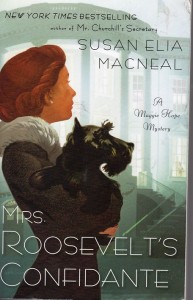Book Review: Mrs. Roosevelt’s Confidante by Susan Elia MacNeal
It is late December, 1941. The Japanese have attacked Pearl Harbor, and America is now at war with the Axis powers. The United States’ alliance with Great Britain is now an active one, and to cement that alliance, Prime Minister Winston Churchill has crossed the ocean to confer with President Franklin Delano Roosevelt.
Accompanying Mr. Churchill is secret agent Maggie Hope, posing as a humble typist. When Eleanor Roosevelt expresses worry about one of her employees who hasn’t shown up for work, Maggie volunteers to go with her to check on Blanche Balfour’s health. As it happens, that young woman’s health is impaired by the fact that she’s dead, an apparent suicide. There appears to have been a suicide note implicating Mrs. Roosevelt, but the note itself is missing. Maggie smells foul play.
This is the fifth Maggie Hope mystery novel; I have not read the previous ones. This volume is not much of a mystery from the reader’s point of view; we are privy to scenes Maggie is not, so it is really more of a thriller. Also mixed into the plot are the upcoming execution of a young black man (whose trial stinks on ice) and the British intelligence service trying to find out about Germany’s rocket program.
Ms. MacNeal has done extensive research, and cites her sources in a “Historical Notes” section at the end. This results in a lot of name-dropping and factoids scattered throughout the book. I did spot one anachronistic reference; World War Two buffs will know it when they see it.
One of the themes of the book is that leaders are human; they have good qualities, but can also have unpleasant sides, wrong opinions, and do less than good things in pursuit of what they consider more important goals. Both Maggie and her current lover, benched RAF pilot John, must make difficult decisions about their priorities and what will be the best course of action to win the war.
Thankfully, there’s at least one actual villain in the book to provide some moral clarity–they’re a bad person in every important way, and we can cheer Maggie on as she opposes them. There’s also some Hope family drama back in England, presumably to set up the next volume in the series.
Maggie Hope herself is (as so often in historical mysteries) a woman way ahead of her time in attitudes and behavior. It’s sufficiently supported by her special circumstances.
There’s period racism and to a lesser extent sexism and homophobia, as well as that apparent suicide.
Recommended for fans of historical mysteries and spy thrillers.

